#ornithischian
Explore tagged Tumblr posts
Text




a group of little weirdos :}
#my art#paleoart#dinosaurs#dinovember#hypsilophodon#brachytrachelopan#yi qi#myosaurus#therapsid#sauropod#Scansoriopterygid#Ornithischian#my littkle naked mole rat leopard gecko son
940 notes
·
View notes
Text
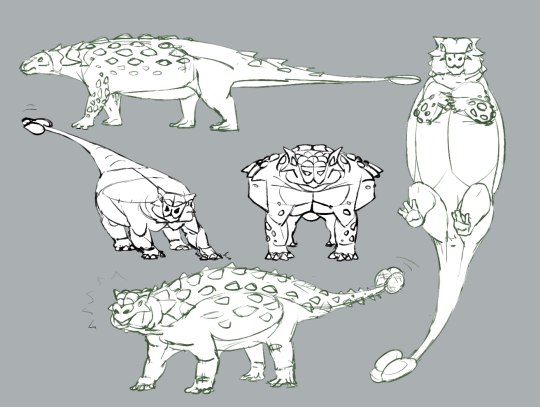
ANKYLOS!
#dinosaur#ankylosaurus#paleoart#digital art#paleontology#prehistoric#tarchia#thyreophora#ankylosauria#ornithischian#herbivore#tank#barrel
2K notes
·
View notes
Text
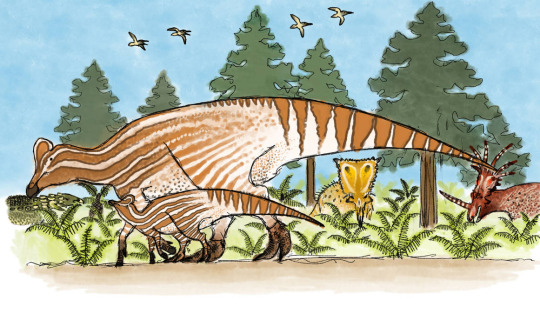
Mother and Son’s Day Out, Dinosaur Park Edition
#hypacrosaurus#hadrosaur#hadrosaurs#late cretaceous#campanian#ceratopsians#ceratopsian#chasmosaurus#styracosaurus#edmontonia#dinosaur park formation#cretaceous#paleoart#dinosaur#dinosaurs#paleontology#palaeontology#paleontology art#ornithischian#ornithopod#ornithischians#ornithischia#paleobiology#paleoblr#palaeoblr
427 notes
·
View notes
Text

study pose. ceratopsian woman
#art#drawing#digital art#digital conte#sketch#figurative art#figurative drawing#anthro#furry#dinosaur#anthro art#furry art#saurian#ceratopsian#ornithischian#scalie#dynasoar5#ssohardd#chalk
960 notes
·
View notes
Text
#Paleostream 22/03/2025
here's today's #Paleostream sketches!!!
today we sketched Sauroposeidon, Thescelosaurus, Vespersaurus, and Knoetschkesuchus




#Paleostream#paleoart#digital art#paleontology#digital artwork#artists on tumblr#palaeoart#digital illustration#sciart#id in alt text#dinosaur#sketch#sketches#paleoblr#palaeoblr#sauropod#Sauroposeidon#oviraptorosaur#Microvenator#ornithischian#Thescelosaurus#theropod#noasaurid#Vespersaurus#pterosaur#tapejarid#Torukjara#croc#eusuchian#Knoetschkesuchus
113 notes
·
View notes
Text

pachycephalosaurus wyomingensis
179 notes
·
View notes
Text
Spectember/Spectober 2024 #07: Mole Dino
Today's spec creature is a combination of a couple of submissions – James P. Quick asked for "a post-K/Pg relict dinosaur from pre-glaciation Antarctica", and an anonymous asked for "a subterranean (like, say, Talpa or Spalax) burrowing dinosaur":
At the time of the K/Pg mass extinction some of the small ornithopods that inhabited Late Cretaceous Antarctica had been developing increasingly complex burrowing behavior and a more generalist omnivorous diet than most other ornithischians – and, along with their ability to endure the long dark cold polar winters, this was juuust about enough for them to survive while the rest of their non-avian cohorts vanished.
They were very briefly a fairly successful disaster taxon in the devastated polar forests, but they were quickly displaced by other diversifying survivors and never really got another ecological foothold to regain anything close to the non-avian dinosaurs' former glory.
Instead the little ornithopods specialized even further for burrowing, spending more and more of their lives underground to avoid the increasing competition and predation from mammals and birds.

Now, well into the Cenozoic at the dawning of the Miocene, Cthonireliqua quicki is the very last representative of the non-avian dinosaurs. Small and stocky and mole-like, just 15cm long (~8"), it has muscular forelimbs with large shovel-like claws, a keratinous shield on its head, and a thick bristly tail where large fat reserves are stored.
Its eyes are almost completely absent, only vestigial remnants present under the skin of its face, and it navigates its extensive burrows using sensitive whisker-like filaments and its keen senses of hearing and smell. Still omnivorous like its ancestors, it feeds on whatever it comes across while tunneling – mainly worms, insects, smaller vertebrates, roots, and tubers.
Unfortunately for Cthonireliqua, and the rest of its Antarctic ecosystem, time is running out. Over the last few million years Antarctica's climate has been steadily cooling and drying, the continent has become fully isolated, and the Antarctic Circumpolar Current has formed. Glaciation is well underway in the continental interior, and the once-lush forests are shrinking away and being replaced with tundra.
Soon all evidence of these dinosaurs' existence will be buried under the ice.
#spectember#spectober#spectember 2024#speculative evolution#ornithopod#ornithischian#dinosaur#art#science illustration
153 notes
·
View notes
Text



Antediluvian Ark_Styracosaurus & Brachyceratops. Digital, 2024.
Inspired by Joel Sartore's Photo Ark project and a color scheme by Australian paleoartist Peter Schouten.
References Bell, P.R., Hendrickx, C., Pittman, M. et al. The exquisitely preserved integument of Psittacosaurus and the scaly skin of ceratopsian dinosaurs. Commun Biol 5, 809 (2022). https://doi.org/10.1038/s42003-022-03749-3
Anatomy: Greg S. Paul, Scott Hartman.
-----------------------------------------------------------------------
Instagram Pinterest Artstation (roughs and studies included)
#paleoart#dinosaur#ornithischian#ceratopsian#styracosaurus#brachyceratops#scientific illustration#digital
136 notes
·
View notes
Text
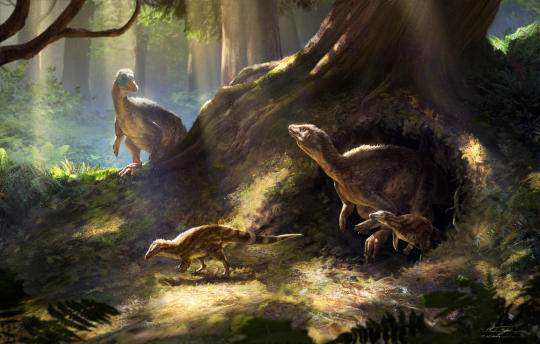
Thescelosaurus neglectus by Anthony J. Hutchings.
#paleoart#paleontology#dinosaurs#fossil#cretaceous#fossils#thescelosaurus#ornithopod#ornithischian#feathered dinosaur
363 notes
·
View notes
Text
Triceratops






26 notes
·
View notes
Text
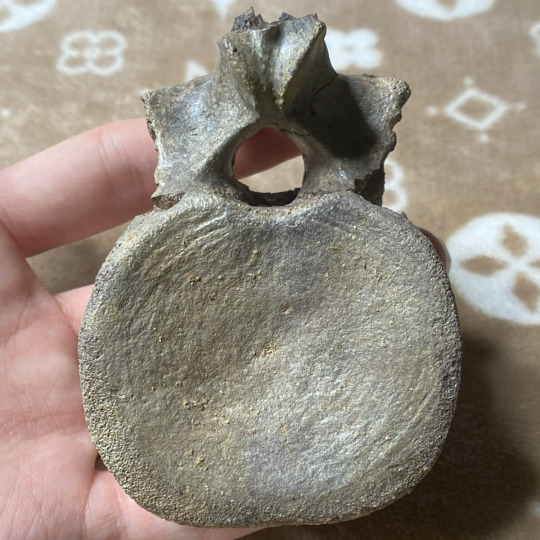
A fossilized vertebra of a Levnesovia transoxiana from the Bissekty Formation in Dzharakuduk or Uchkuduk, Kyzylkum Desert, Uzbekistan. This early diverging hadrosauromorph belongs to a group that includes the famous "duck-billed" dinosaurs. This relatively small hadrosaur was likely prey for the basal pantyrannosaur Timurlengia and the large theropod Ulughbegsaurus.
#dinosaur#fossils#paleontology#palaeontology#paleo#palaeo#levnesovia#hadrosaur#ornithopod#ornithischian#cretaceous#mesozoic#prehistoric#science#paleoblr#レヴネソヴィア#ハドロサウルス科#恐竜#化石#古生物学
79 notes
·
View notes
Text
Silesaurus
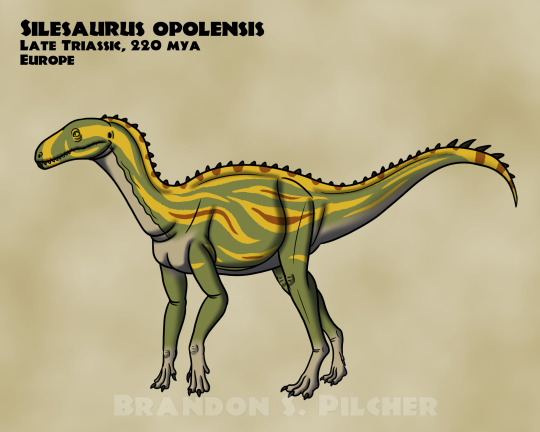
Silesaurus opolensis was an dinosauriform archosaur that lived in Europe during the Late Triassic Period around 220 million years ago. An insect-eater with a body length of around seven and a half feet, Silesaurus has been traditionally considered a member of a sister lineage to dinosaurs proper, but some recent paleontological analyses suggest that it may be a true dinosaur at the base of the ornithischian lineage (the grouping of dinosaurs that includes the duck-billed hadrosaurs, the armored stegosaurs and ankylosaurs, and the horn-faced ceratopsians). Like the ornithischians, Silesaurus appears to have had a beak covering the tip of its lower jaw (or predentary).
34 notes
·
View notes
Note
Happy ween!!!
Trick or treat
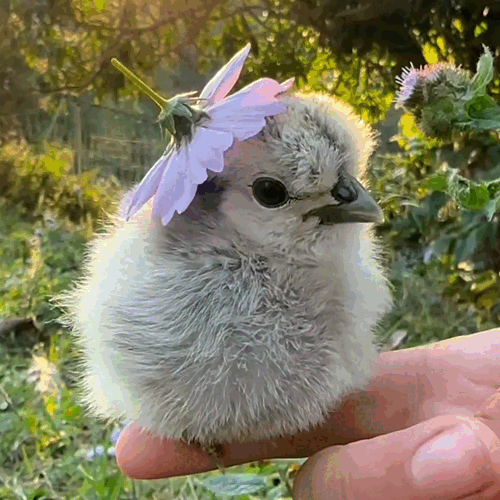
What a precious bean! Love the fashion accessory

Jakapil!
76 notes
·
View notes
Text

Dinovember 2024 Day 2: Iguanodon bernissartensis
#iguanodon#paleoart#dinosaur#dinosaurs#paleontology#dinovember 2024#draw dinovember#dinovember#ornithischian#ornithopod#ornithopods#ornithischians
162 notes
·
View notes
Text

watercolor sketch. profile view of a sauropod woman in a headdress
#art#sketch#drawing#watercolor#digital watercolor#study#anthro#furry#dinosaur#saurian#sauropod#anthro art#furry art#fantasy art#dynasoar5#ssohardd#scalie#ornithischian
1K notes
·
View notes
Text
#Paleostream 22/02/2025
here's today's #Paleostream sketches!!!
today we sketched Eryops, Plateosaurus, Mahuidacursor, and Koreaceratops




#Paleostream#paleoart#digital art#paleontology#digital artwork#artists on tumblr#palaeoart#digital illustration#sciart#id in alt text#dinosaur#temnospondyl#amphibian#Eryops#sauropodomorph#Plateosaurus#ornithischian#Mahuidacursor#ceratopsian#Koreaceratops#sketch#sketches
132 notes
·
View notes